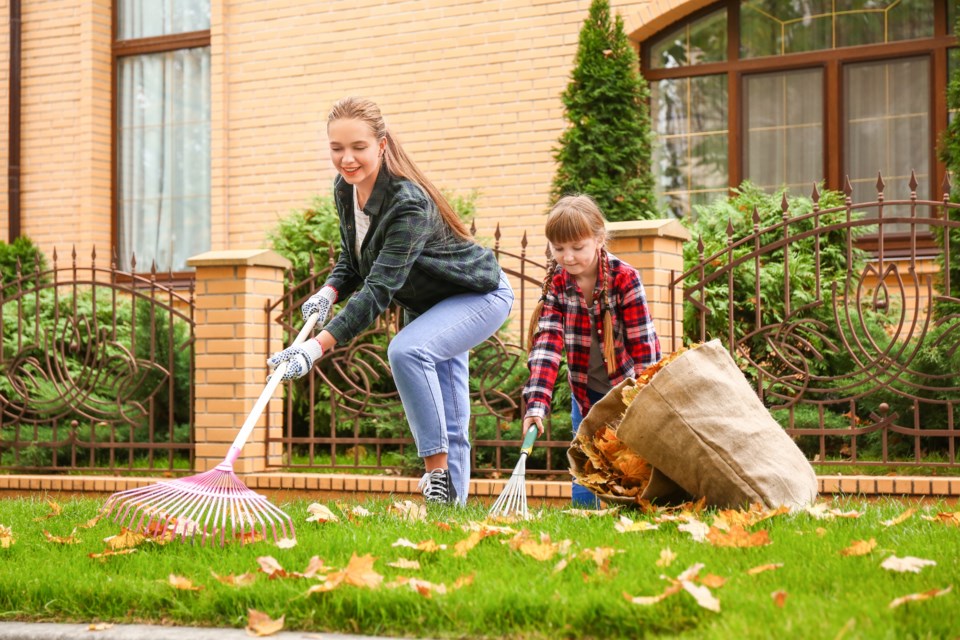This time of year, there is much outdoor work to be done. We have leaves to rake, gardens to put to bed, and homes to ready for the upcoming winter.
Unfortunately, these seemingly straightforward tasks can result in injury. When raking leaves, for example, people often end up with back pain, discomfort or repetitive strain.
We asked the folks at Mariposa Physiotherapy & Rehabilitation to share their top tips for preventing injury this fall.
Before you even head outdoors, make sure you have the proper equipment
First and foremost, you will need to use a rake that suits your size. If you don’t, you can strain your back from bending too much or rolling your shoulders too far forward.
How do you gauge the right size?
The rake you choose should come up to the height of your chin and it shouldn’t be too heavy for you to use comfortably—a wide, plastic rake weighs less and can make the job a little quicker.
Also, be sure you have a pair of gloves; this will stop you from over-gripping the rake, which can cause repetitive strain or painful blisters.
Last, make sure you’re wearing supportive shoes that provide good traction. Grass and leaves can be surprisingly slippery. You want as much support for your back and hips as possible, and to prevent slips and falls, ankle sprains and foot pain.
Once you’re outside, start by warming up
It can help if you think of raking just as you would exercise. Take 5-10 minutes to ensure that you’ve warmed your muscles sufficiently before you begin. You can accomplish this through the use of big, dynamic movements, such as marching on the spot, walking or jumping jacks. These exercises will get your heart rate up and increase blood flow to your muscles. Once this occurs, your muscles will have loosened up and you’ll be much less likely to experience an injury.
The next step is to remember your posture
Neglect this and your neck, lower back and shoulders will soon feel the stress. Ideal posture includes keeping your knees bent, your back straight and your shoulders and chin back. It can also help to keep your feet shoulder-width apart, with one leg in front of the other. Avoid reaching outside your body frame when raking and lifting.
It’s important to avoid twisting when you’re raking, as well as lifting bags and leaves. It’s much better to bring your bag or bin close to your pile of leaves and lift directly in front of you. As often as you’re able, switch the side you’re holding the rake to equally work both sides of your body and avoid overstressing one side.
Don’t overdo it!
You really want to pace yourself. It can be tempting to throw yourself into the task and try to work quickly in order to get it all done, but you’ll suffer for it. Yard work is an aerobic activity and you don’t want to stress the body too intensely. Section your yard and tackle it in stages; even better, break the task up over a couple of days or weekends.
While you’re out there, be sure to take regular breaks—the professionals at Mariposa suggests every 20-30 minutes—and drink lots of water. Dehydrated muscles are more prone to injury and cramping. Stand up tall and stretch your back and chest several times while you work.
After a break, lightly stretch your forearms, shoulders, back, hips, legs and calves before starting up again. Also, be mindful of switching the positions of your hands and feet every so often; this will save you from overworking one side.
Maybe the best advice is to make raking leaves a family affair! There’s no reason you have to shoulder the responsibility alone and the more helping hands the easier the task will be. Sharing the load between multiple people has the practical benefit of helping prevent repetitive strain.
Once done, congratulate yourself by taking time to stretch. Use long, purposeful holds—no bouncing—and hold each stretch for about 30 seconds. Remember to be gentle; stretches should never cause pain.
It’s not unusual to experience some mild muscle soreness when doing home maintenance activities like raking that you usually only do at certain times of the year. Because these tasks are done so infrequently, your body considers it a new activity. If you do happen to experience discomfort, it should only last a day or two. If you find it interferes with your daily functioning or you have lasting symptoms, reach out to a Physiotherapist. They can help you resolve any injuries quickly and prevent concerns from becoming prolonged.
For more information on how to stay healthy and pain-free this fall, visit Mariposa Physiotherapy & Rehabilitation or call 705-327-0008.
